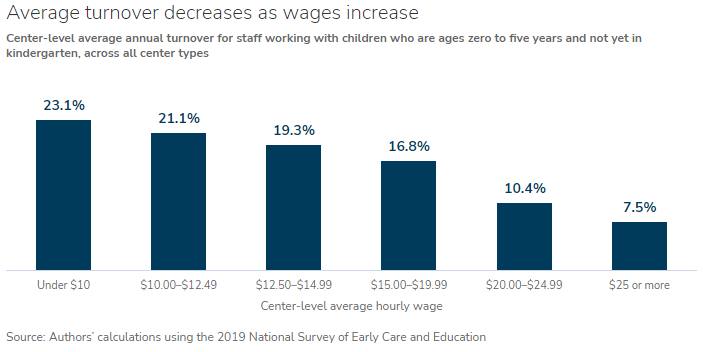
From First Five Years Fund
A new report finds that early educator turnover disrupts child-teacher relationships, which are crucial to children’s developmental outcomes. Researchers further found that turnover is higher in child care centers where wages are lower and in centers that serve children whose families receive subsidies. In centers where the average wage was below $10 per hour, 23.1% of staff leave over the course of a year. Centers where the average wage was at or above $25 per hour, however, have an average annual turnover of 7.5%. These findings emphasize the importance of compensating early educators to ensure children receive high-quality care with continuity.

Research clearly demonstrates that the quality of child-teacher interactions and relationships is the most important factor in supporting positive child development outcomes. Children benefit from stable attachment to caregivers, but when early educators leave the field, often due to low compensation and poor working conditions, young children experience disrupted learning and development. A Head Start study found that young children who experienced high teacher turnover had fewer gains in vocabulary and literacy, as well as increased behavioral problems as reported by parents, than their peers who had more continuity with their educators.
Other research confirms that early educator wages are positively associated with program quality and negatively associated with turnover rates. Across the nation, states have been working to increase compensation and offer wage bonuses to early educators, particularly in the midst of the pandemic as child care workers have faced profound health and economic challenges in serving young children and their families. One study in Virginia used funding from a federal Preschool Development Grant to pilot the Teacher Recognition Program, which offered a $1,500 bonus payment over an eight-month period. Findings show this bonus reduced turnover from 40 to 18% among assistant teachers and from 30 to 14% among lead teachers in child care centers.
The report concludes by highlighting that wages, benefits, working conditions, and subsidies for child care programs should all be designed with turnover, and its effects on children, in mind. As the nation already has many young learners behind due to the effects of the pandemic, increased federal investments to ensure the early care and education workforce is compensated, and children receive the high-quality and continuous supports they need, is essential.
Read the full report here.